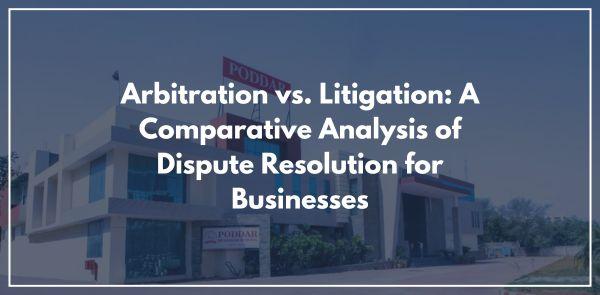
Introduction
In the fast-paced world of business, disputes are inevitable. Resolving these disputes efficiently and cost-effectively is crucial for business continuity. Two primary methods of dispute resolution—arbitration and litigation—offer distinct advantages and challenges. While litigation is the traditional court-based system, arbitration has gained popularity as an alternative dispute resolution (ADR) mechanism. This article compares arbitration and litigation, highlighting their differences, advantages, and implications for businesses.
At Poddar Business School, students explore arbitration and litigation through case studies, business simulations, and industry insights. With a strong legal and management interface, the PGDM and MBA programs equip future leaders with cost-effective dispute resolution strategies, essential for sectors like hospitality, food, and agri-business. Through global exposure and innovative research, students gain the skills to navigate legal complexities, ensuring business sustainability and growth.
Understanding Arbitration and Litigation
Arbitration is a private dispute resolution process where parties agree to have their disputes settled by a neutral third party (arbitrator) rather than going to court. The arbitration process is governed by an arbitration agreement and is typically binding on the parties.
Litigation, on the other hand, is the formal judicial process where disputes are resolved in courts. It follows rigid procedural laws and involves public hearings, evidence presentation, and legal arguments before a judge (and sometimes a jury). Court judgments are binding, but they can be appealed to higher courts.
Key Differences Between Arbitration and Litigation
Aspect
Arbitration
Litigation
Nature
Private, confidential
Public, court proceedings
Time Efficiency
Faster resolution
Time-consuming (years in some cases)
Cost
Generally lower
Higher due to legal fees, court costs
Flexibility
Parties can choose arbitrators, procedures
Rigid court rules and procedures
Binding Effect
Usually binding, limited appeal options
Binding but allows multiple appeals
Enforceability
Enforceable globally under treaties (e.g., New York Convention)
Limited to national jurisdictions
Legal Complexity
Less formal procedures
Strict legal procedures and technicalities
Advantages of Arbitration for Businesses
- Confidentiality – Arbitration proceedings are private, protecting sensitive business information.
- Speed – Cases are usually resolved faster than court cases.
- Cost-Effectiveness – Lower legal and procedural costs compared to litigation.
- Expert Decision-Makers – Arbitrators can be chosen based on their expertise in business or industry-specific matters.
- International Recognition – Arbitration awards are enforceable in multiple countries under international treaties.
Advantages of Litigation for Businesses
- Legal Precedent – Court judgments create legal precedents that can guide future disputes.
- Stronger Enforcement – Court rulings have the backing of state power for enforcement.
- Right to Appeal – Provides opportunities for review and correction of judicial errors.
- Protection Against Unfair Practices – Courts ensure fairness and legal compliance.
Challenges of Arbitration and Litigation
- Arbitration may lack transparency, and arbitrators' decisions are often final, limiting appeal options.
- Litigation is expensive and slow, making it less attractive for businesses seeking quick resolution.
- Enforcing arbitration awards can be difficult in countries that do not recognize international arbitration agreements.
Conclusion
Both arbitration and litigation play significant roles in business dispute resolution. While arbitration is preferred for its speed, confidentiality, and cost-effectiveness, litigation provides stronger legal enforcement and precedents. Businesses should carefully evaluate their needs, jurisdictional laws, and contractual terms before choosing the appropriate dispute resolution mechanism.
In the evolving business environment, hybrid models like Med-Arb (Mediation-Arbitration) are also emerging, offering a mix of both processes. Ultimately, selecting the right dispute resolution method depends on the nature of the dispute, business priorities, and the legal framework governing the case.
